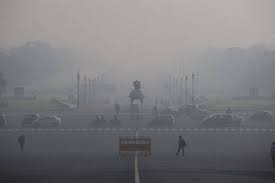Delhi's air quality hits 'poor' category
The national capital's air quality was recorded in the “poor” category for a brief period Wednesday morning, according to the Central Pollution Control Board.

The national capital's air quality was recorded in the “poor” category for a brief period Wednesday morning, according to the Central Pollution Control Board.
PM10 levels in Delhi-NCR stood at 225 microgram per cubic metre (µg/m3) at 10 am, which is the highest in over three months, according to CPCB data.
PM10 is the particulate matter with a diameter of 10 micrometres and is inhalable into the lungs. These particles include dust, pollen and mold spores.
The city recorded an air quality index (AQI) of 207 at 10 am, which falls in the “poor” category.
On Tuesday, Delhi recorded a 24-hour average AQI of 178, which falls in the “moderate” category. It was 179 on Monday.
An AQI between 0 and 50 is considered 'good', 51 and 100 'satisfactory', 101 and 200 'moderate', 201 and 300 'poor', 301 and 400 'very poor', and 401 and 500 'severe'.
The Ministry of Earth Sciences' air quality monitor, SAFAR, had said the air quality may turn “poor” by Thursday due to unfavourable meteorological conditions and a spike in farm fires in Punjab, Haryana and the neighbouring border regions.
The fire count was 298 on Monday, the System of Air Quality and Weather Forecasting and Research (SAFAR) said.
"Boundary layer wind direction is favourable for transport (of pollutants). Farm fires will start impacting Delhi in the coming days," it said.
Also, there is a marked dip in minimum temperatures recorded in Delhi. On Wednesday, it settled at 18.6 degrees Celsius, three notches below normal.
Low temperatures and stagnant winds help in accumulation of pollutants near the ground, affecting air quality.
The Delhi government on Monday launched a massive anti-air pollution campaign.
Chief Minister Arvind Kejriwal said he himself will review the situation daily. A war room is being set up at the Delhi Secretariat to monitor the steps being taken to deal with high levels of air pollution in winters.
Starting October 15, stricter measures to fight air pollution will also come into force in Delhi and its neighbourhood as part of the Graded Response Action Plan, which was first implemented in Delhi-NCR in 2017.
These measures include increasing bus and metro services, hiking parking fees and stopping use of diesel generator sets when the air quality turns poor.
When the situation turns "severe", GRAP recommends closure of brick kilns, stone crushers and hot mix plants, sprinkling of water, frequent mechanised cleaning of roads and maximising power generation from natural gas.
The measures to be followed in the "emergency" situation include stopping entry of trucks in Delhi, ban on construction activities and introduction of the odd-even car rationing scheme.